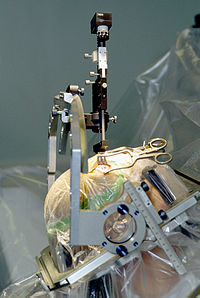
Photo from wikipedia
Introduction Robotic surgical performance, in particular suturing, has been linked to post-operative clinical outcomes. Prior to attempting live surgery, virtual reality (VR) simulators afford opportunities for training surgeons to learn… Click to show full abstract
Introduction Robotic surgical performance, in particular suturing, has been linked to post-operative clinical outcomes. Prior to attempting live surgery, virtual reality (VR) simulators afford opportunities for training surgeons to learn fundamental technical skills. Herein, we evaluate the association of suturing technical skill assessments between VR simulation and live surgery, and functional clinical outcomes. Materials and Methods 20 surgeons completed a VR suturing exercise on the MimicTM Flex VR simulator and the anterior vesicourethral anastomosis during robot-assisted radical prostatectomy (RARP). Three independent and blinded graders provided technical skill scores using a validated assessment tool. Correlations between VR and live scores were assessed by Spearman's correlation coefficients (ρ). In addition, 117 historic RARP cases from participating surgeons were extracted, and the association between VR technical skill scores and urinary continence recovery were assessed by a multi-level mixed-effects model. Results A total of 20 (6 training and 14 expert) surgeons participated. Statistically significant correlations for scores provided between VR simulation and live surgery were found for overall and needle driving scores (ρ = 0.555, p = 0.011; ρ = 0.570, p = 0.009, respectively). A sub-analysis performed on training surgeons found significant correlations for overall scores between VR simulation and live surgery (ρ = 0.828, p = 0.042). Expert cases with high VR needle driving scores had significantly greater continence recovery rates at 24 months following RARP (98.5% vs. 84.9%, p = 0.028). Conclusions Our study found significant correlations in technical scores between VR and live surgery, especially amongst training surgeons. Additionally, we found that VR needle driving scores were associated with continence recovery following RARP. Our data support the association of skills assessments between VR simulation and live surgery and potential implications for clinical outcomes.
Journal Title: Journal of endourology
Year Published: 2022
Link to full text (if available)
Share on Social Media: Sign Up to like & get
recommendations!